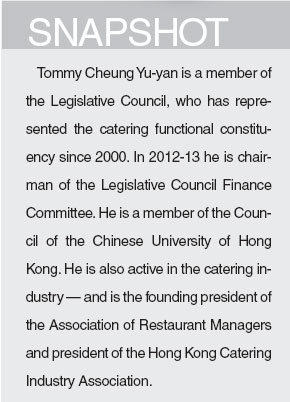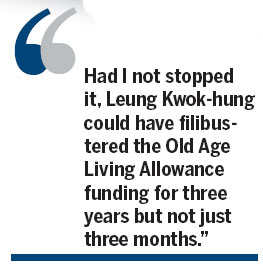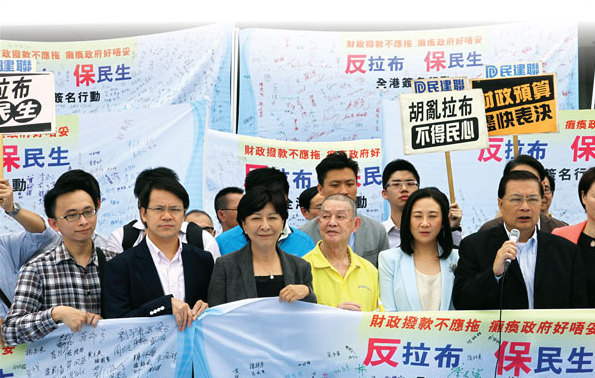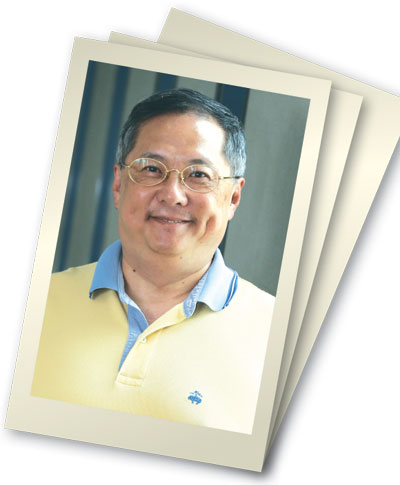Ghost of filibuster lingers
Updated: 2013-09-20 15:34
By Joseph Li(HK Edition)
|
|||||||||
With the new legislative session about to begin and public consultation on political reform on the horizon, Legislative Council Finance Committee Chairman Tommy Cheung worries that the current climate of legislative delays caused by opposition filibusters will only get worse. Joseph Li writes.
Filibusters have begun reappearing, disrupting Legislative Council Finance Committee meetings. Committee chairman Tommy Cheung Yu-yan is critical of lawmakers causing the delays and rues the fact that under existing rules nothing can be done to stop them.
"I guess filibusters will continue in the coming years, particularly the constitutional reform is approaching. As can be seen from their past behavior, they (the opposition) can filibuster at any time, on any issue to sting the government."
Cheung laments that unlike the President of the Legislative Council, who has power (though not explicitly), to curtail filibusters, he has no power to do the same in the Finance Committee. At FC meetings, advance notice of motions is not required and lawmakers may table motions in the midst of meetings.
|
Pro-establishment lawmakers stage an anti-filibuster rally outside the Legislative Council Building in March against the opposition's disruptive tactics to delay the passsage of the Budget. |
|
Tommy Cheung says filibusters at Finance Committee meetings were unprecedented. He fears that filibusters will continue to happen quite often in the coming years, knowing the existing procedures are quite helpless in stopping them. Edmond Tang / China Daily |

"The Liberal Party, including me, feels a mechanism is needed to prevent filibusters from going on endlessly," he suggested. "In democratic countries, opposition and minority parties may filibuster but the right to do so should not be abused. We have a duty to strike a balance between orderly operation of the legislature and freedom of speech."
Destructive filibusters spread last year, from plenary meetings to Finance Committee (FC) meetings. Funding for the Old Age Living Allowance (OALA) was held up nearly three months, from October 2012, until committee chairman Tommy Cheung 'unintentionally' halted the drawn out debate before Christmas.

"Filibusters at FC meetings were unprecedented," Cheung told China Daily. It was not right for lawmaker Leung Kwok-hung (nicknamed Long Hair) to delay the OALA, yet, Cheung complains, he was obliged to allow countless amendments submitted by Leung in accordance with the Finance Committee Procedures (FCP).
"The way Long Hair delayed the OALA funding was just like some people today who claim they will occupy Central if they can't get what they want," Cheung pointed out.
"Knowing the OALA was one of Chief Executive Leung Chun-ying's election pledges and that the government wanted it implemented as soon as possible, Long Hair attempted to drag it down and force the government to give in to his will. He was only 'sanitizing' his behavior by claiming he was not opposing the OALA but was in fact fighting for the elderly to have more.
"Eventually, he didn't get what he wanted, while the elderly didn't get the allowances for October and November. Had I not stopped it, he could have filibustered for three years but not three months.
"But if public opinion backfires, filibusters will be less rampant. I hope the elderly who lost two months' allowances will remember 'Long Hair' and not to vote for him in future."
The pro-establishment and opposition camps, represented by Ip Kwok-him and Alan Leong respectively, discussed measures to regulate filibusters, but their dialogue broke down.

Ip also introduced a motion, hoping to limit the number of motions a lawmaker could submit at FC meetings to only one, which would require prior written notice. Opposition parties killed the measure by filing a staggering 1.8 million amendments to counter Ip's motion.
Cheung says he understands why some lawmakers choose to filibuster. Sometimes the government does not listen to suggestions once it has garnered sufficient votes.
In July, the FC examined another controversial funding application for expanding the city's three landfills. Due to strong opposition from local residents about the bad odor, the government withdrew the Tseung Kwan O proposal.
Unlike the OALA filibuster where Leung Kwok-hung was the lone star, several opposition lawmakers submitted over 1,200 amendments with the intent to block the funding.
There was no way for the funding to be approved before the summer recess, Cheung said. Drama occurred when Liberal Party leader James Tien Pei-tsun moved to adjourn debate on funding for the Tuen Mun and Ta Kwu Ling landfills. The motions were carried. Had they been vetoed, a long filibuster no doubt would have followed.
Cheung said it was not bad to defer funding until October to allow the government time to develop for remedial measures during the summer, given the outrage of Tuen Mun residents.
He said he sensed, however, that government officials were unhappy with the adjournment, saying it was their wishful thinking that if the proposals were put to vote, funding for the less controversial Ta Kwu Ling landfill could have been carried.
(HK Edition 09/20/2013 page8)

